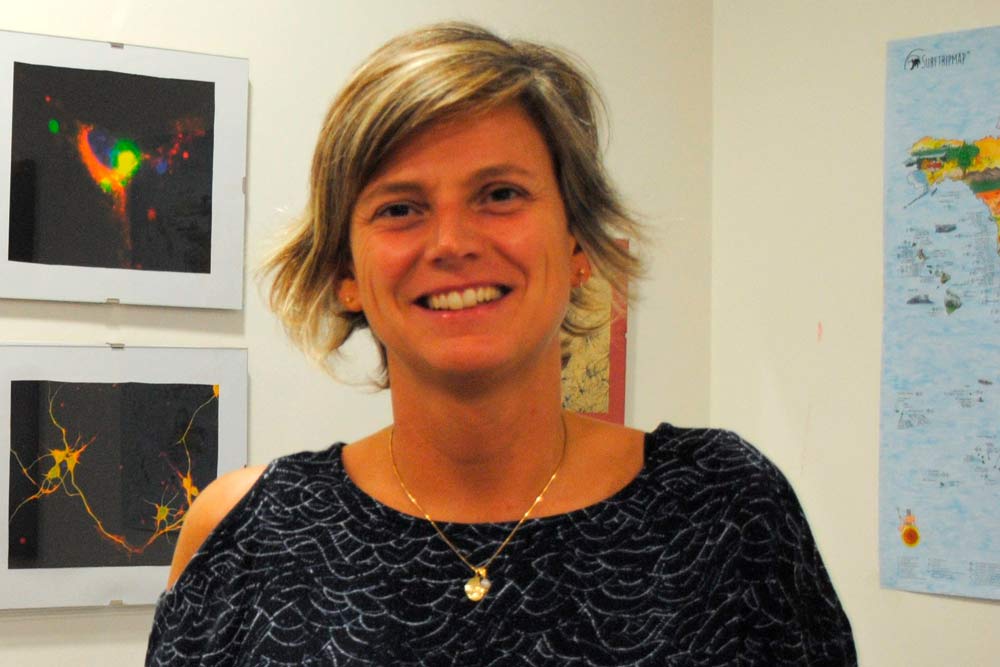
Cristina Malagelada «We can now know when and how severely will a patient with Parkinson’s disease suffer from dyskinesia»
(Year 2017)
The research group led by Dr. Cristina Malagelada of the Department of Biomedicine of the Faculty of Medicine of the UB has developed a method to predict how dyskinesia will affect patients with Parkinson’s disease. The group has recently received a VALUNI (VALUNI16-1-0057) grant to market this technology via patent licensing. Dr. Malagelada will also present this technology at the 16th Farma-Biotech Cooperation Meeting (Farmaindustria), which will take place in Madrid in November.
What is special about your research on Parkinson’s disease?
Since 1960, L-DOPA is the main drug prescribed to patients with Parkinson’s. For some patients, it works really well, but for some others it stops working and causes tremors called dyskinesia that can be very crippling. No one knows the severity with which dyskinesia will show nor when it will start once the treatment has begun.
Through a signaling pathway of 64 genes, we studied whether patients suffering from dyskinesia could be differentiated by means of genetic markers. Over the course of two years, we performed different analysis on over 1,400 patients and concluded that the patients who suffered dyskinesia sooner and more severely could be identified thanks to a few specific markers. Now we want to turn this into a diagnostic method. Thus, were a person diagnosed with Parkinson’s disease, we would carry out a genetic analysis (with blood or saliva) to map their DNA before starting the medication, in order to see how soon they will show dyskinesia. Right now there is practically no alternative to the L-DOPA therapy, hence the importance of this test.
What benefits would this analysis bring to patients?
Dyskinesia causes involuntary and very violent movements, which are different from those caused by Parkinson’s and prevent people from living normal lives. The problem is that patients spend a lot of energy in all these movements, and this leads to significant weight loss, and poor life quality. Moreover, once dyskinesia sets in there is usually no way back.
This analysis method can allow us to stratify patients, so that we can start the L-DOPA treatement later on those people who are at greater risk of suffering from dyskinesia more severily and from early on, or that we start combining it with dopaminergic agonists.
At what point is your method now?
Right now we want to find a company to license the method and validate the technique. The method has worked with the patients of the Clinical Hospital, but we have to see if it works with other populations, given that the occurrence of markers may vary according to the genetic background of patients. Our expectations regarding the contact with companies are somewhat uncertain, because after the crisis companies only want to bet on the winning horse. However, we believe that our work may be of interest to diagnostic or biotechnology companies that sell drugs for dyskinesia, as it would also be a very good way to stratify patients and to fine-tune the dosages.
Do you think a cure for Parkinson’s will ever be found?
I think it will be easier to prevent the disease than to cure it. Once the disease is diagnosed, the patient lacks 70% of dopaminergic neurons. Replacing these neurons is very complicated, because the disease does not only affect cells but also their environment. If we do not determine its cause or multiple causes first, it will be really difficult to find a cure for it.
Why is knowledge transfer important?
The transfer of knowledge is almost a duty that researchers have towards society. We spend our lives locked up in a laboratory where it seems we only do weird things; thus, having a discovery actually applied is our way of returning to society. If, in the best case scenario, this method could improve people’s lives, I would be very happy on a personal level.
More about Cristina Malagelada
The best invention in history:
The best inventions in history are those that carry out tasks that we would otherwise have to carry out ourselves.
An advancement you would like to see:
Therapies that modify and stop the course of neurodegenerative diseases.
The invention you are most afraid of:
Artificial intelligence. Now, when we look for stuff in Google, it already offers solutions before we can even type them. This is a bit disturbing. To what extent will we be free to decide what we want or do not want? I wonder whether we will be conditioned by what artificial intelligence presents before us.
The FBG is…
…an ally. They have always given us solutions and have always made things easier for us. They have opened doors for us that we alone could not have opened, and their attitude has always been focused on facilitating our work, which is much appreciated.
Supported by:


